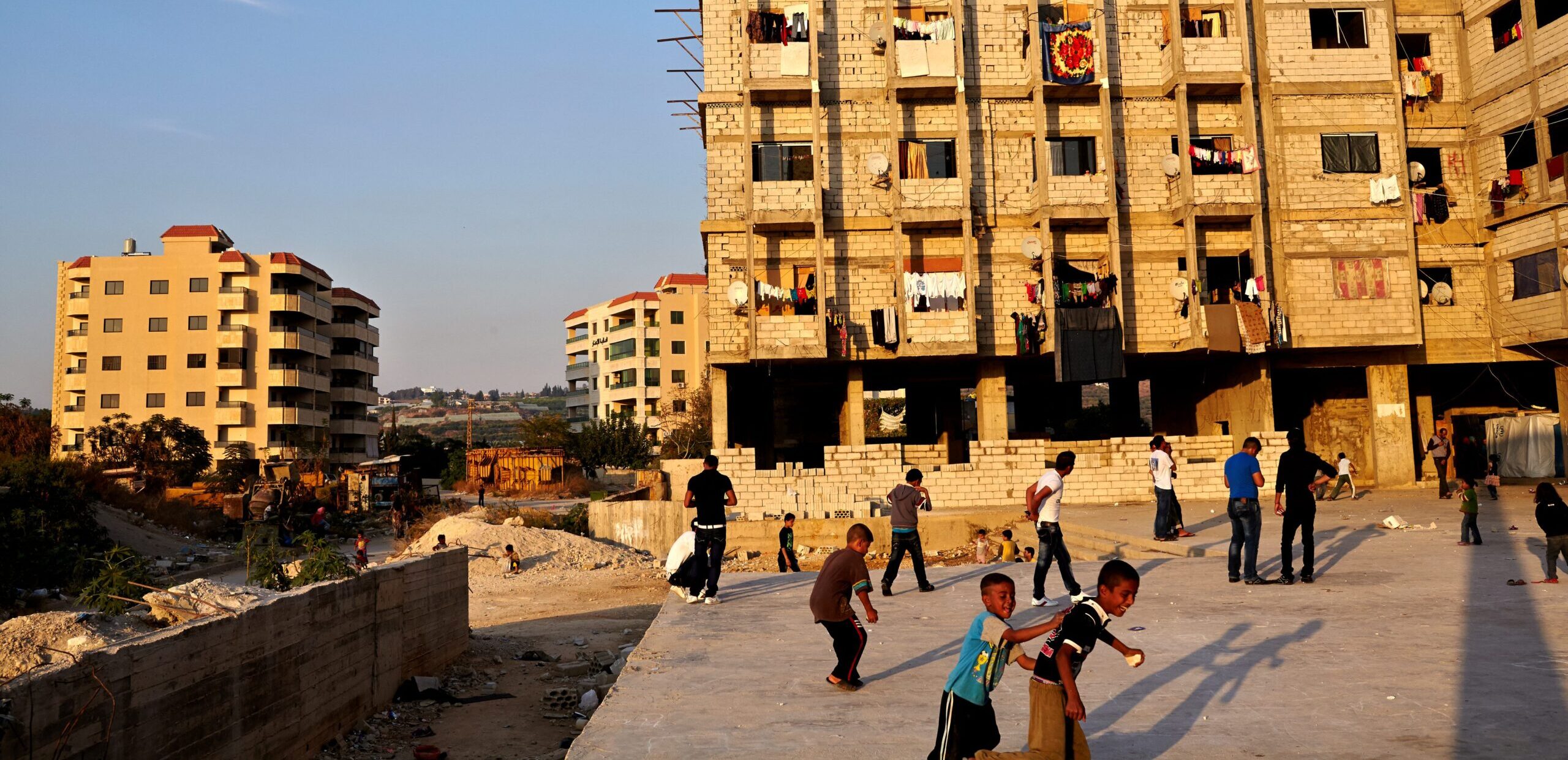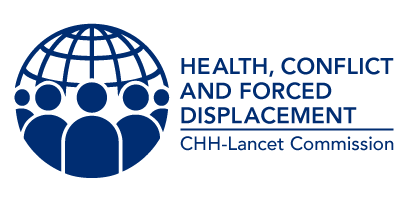
The Commission is structured along thirteen working groups to guide its inquiry and recommendations. Employing this approach permits a more systematic and in-depth exploration of specific subtopics within the broader mandate of the Commission. Each working group is led by a Commissioner and supported by thematic experts.
Although groups focus on specific key topics, they do not work in isolation. Strong collaboration among groups drives the Commission’s work. A dedicated cross-cutting working group was established to capture the complex interactions between health, conflict, and forced displacement effectively.
Affected populations & qualitative research
Affected populations need to be at the centre of any effort, along the core idea of “nothing about us, without us”. To ground the Commission’s recommendations in their lived realities, a nested study is conducted in numerous and diverse countries affected by conflict or forced displacement. Led by Commissioners, the study will examine people’s perception of the “humanitarian system” and capture their priorities and recommendations for change. It will consist of diverse qualitative methods and include people working and those affected by conflict or forced displacement.
Working group 1:
Setting the stage
The humanitarian sector has a long history of efforts and commitments to improve its work. This Commission recognizes the importance of examining these initiatives to offer informed recommendations. The group will explore the evolution of the humanitarian system, highlighting key foundations and turning points across cultures, and the shifting dynamics of conflict and its health and humanitarian impacts, while referencing previous Lancet Commissions.
Key themes: Evolution of humanitarian action, foundations of humanitarianism, the changing nature of conflict, consequences of conflict
Working group 2:
International law and humanitarian principles
“International humanitarian law is routinely being broken with impunity in conflicts globally.”; this first sentence of the Commission’s announcement underpins the fundamental role of ethical and legal frameworks. This group explores existing definitions, laws, and humanitarian principles, analyses gaps in compliance and implementation, and assesses whether these approaches are fit for purpose.
Key themes: Legal definitions, International humanitarian law, humanitarian principles, accountability
Working group 3:
Humanitarian governance
Humanitarian governance, encompassing leadership, management, and coordination across various levels, has been the subject of extensive scrutiny. Significant criticisms have emerged on the financing mechanisms, the dominance of the UN and INGOs, and the limited decision-making power of governments and local actors, leading to concerns about inefficiency and lack of accountability. This group will re-examine the systemic frameworks guiding humanitarian governance, with a particular focus on who leads, how to coordinate effectively, and who is accountable.
Key themes: Leadership, accountability, management, coordination, efficiency, effectiveness, independence
Working group 4:
Humanitarian-development-peace nexus
The humanitarian-development-peace nexus (HDpN) is increasingly relevant in today’s complex and protracted crises, where the lines between immediate relief, longer-term development, and peacebuilding are often blurred. This group will re-examine the role of actors in the nexus and move from concepts to practical recommendations.
Key themes: Nexus, HDpN, collaboration, transition, financing, planning, coordination
Working group 5:
Localization and decolonization
Localization emerged as a central topic during the 2016 World Humanitarian Summit. Despite commitments, few practical changes have materialized in the role and funding of local actors. The interconnected but distinct decolonizing agenda has encountered the same challenges. This group will explore actionable strategies to advance both agendas.
Key themes: Meaningful localisation of responses, decentralised decision-making, empowering local actors, decolonising the humanitarian system
Working group 6:
Innovative humanitarian financing
Despite a significant rise in humanitarian financing over the past few decades, the gap between funding and the swiftly growing needs continues to widen. New ways of innovative financing for humanitarian preparedness and response according to different contexts need to be identified. This group will explore the history of humanitarian finance reforms, existing patterns, and novel financing mechanisms.
Key themes: Innovative financing models, funding patterns, donors, integration, social welfare, health insurance
Working group 7:
Research & Evidence
The role of research and scientific evidence has been steadily increasing in the humanitarian sector despite its many challenges. This group will review current successes, ethical issues, challenges and gaps in humanitarian research, including training and capacity building of researchers in this field. The role of non-research information sources in supporting evidence-based decision-making is another area of interest. This group will also review the changes in the existing evidence base to provide novel ideas for its dynamic role in humanitarian settings.
Key themes: Research methods, evidence, research ethics, affected communities, evidence-based decision making
Working group 8:
Education, training & future workforce
What are the needs for educating and training a future workforce and who decides on them? This group will explore the current state of affairs in the humanitarian health sector, proposing solutions to problems that have persisted over the last decade, while also tackling the realities of a changing humanitarian landscape. With a focus on issues such as supply and demand concerns; types of education available; accessibility and quality; the role of human and technological innovations; and the realities of power and privilege, the group will envision a new, broadened workforce definition and configuration.
Key themes: Redefining workforce, democratising learning, co-creation, power-sharing
Working group 9:
Basic humanitarian packages
Basic health packages are vital tools to define what is included and what falls outside the scope of our work. Despite strong efforts by the Disease Control Priority project, no standardized basic humanitarian package exists. This group will revisit the development of a basic humanitarian package to guide humanitarian decision-making in the allocation of limited resources.
Key themes: Standardised package of care, informing leadership and financing, Universal Health Coverage
Working group 10:
Measuring success
How does a successful humanitarian response look like? Who defines success? How do we measure the performance of humanitarian assistance? This group will critically review existing definitions of success as well as current evaluation approaches and measures of performance. We will propose a new evaluation framework that puts communities, accountability and contexts at the center.
Key themes: Redefining success, diversifying measures, accountability to affected communities
Working group 11:
Technology and AI
Rapidly evolving digital innovations provide new opportunities and risks to actors working in crises and – in particular – to people affected by conflicts. This group will dissect these dynamics to propose fundamental principles to underpin their use.
Key themes: Ethical frameworks, challenges and opportunities, impact of AI
Working group 12:
Climate change
Several previous efforts, including some Lancet Commissions, have highlighted the devastating impact of climate change on human health. This group will go beyond climate change and health, to explore their intersections with conflict and forced displacement. Issues such as ‘climate refugees’, forced migration due to climate change, anticipatory action, greening/climate proofing of the humanitarian sector, and the role of climate change exacerbating conflict will be explored.
Key themes: Climate change and conflict/displacement, climate crisis, climate refugees, anticipatory action, greening, climate proofing
Working group 13: Crosscutting themes
Several cross-cutting themes such as gender, culture, and other social determinants of health, as well as racism, stigma and discrimination, underpin research, policy, and practices in humanitarian settings. Population groups living in different vulnerable situations also need special attention. The integration of cross-cutting themes and community-based approaches not only informs better research, policy, and program design but also deepens our engagement with affected communities, leading to more inclusive and empowering humanitarian practices. A dedicated working group was established to review the current international guidelines that address these issues and to ensure that these common themes, including community engagement, are centred in the discussions and adequately incorporated into the Commission’s recommendations.
Key themes: Vulnerabilities, intersectionality, health equity, gender, community engagement
